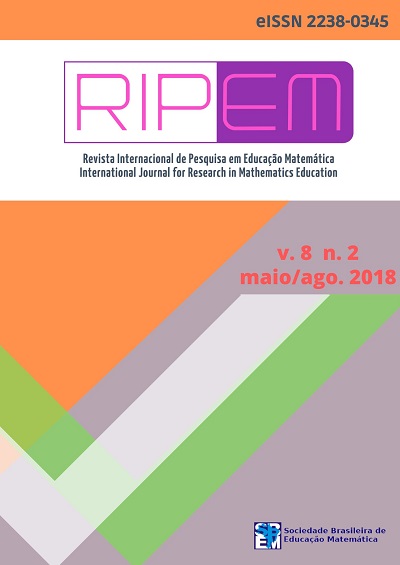Financial Mathematics of bankers’ practice
Palavras-chave:
Financial Mathematics, Practice, Bankers, Banking SystemsResumo
This study aims to present financial mathematics that bankers use in their practice when they are embedded in their workplace. To that end, we observed bankers at two official banks in an inland city of Brazil. Our analysis reveals that financial mathematics actions are structured by banking systems; the actions linked to these systems are characterised by the ways the bankers address the opportunities and limitations of banking systems as cultural tools that serve as a unit of analysis and define specific actions in this context. However, at the same time, it illustrates cases where bankers deal with some limitations of the systems. In other words, while their actions are mediated by these systems, some bankers deliver customer service by considering the customer's specific situation and profile in the decision-making process, thus providing a service that the system alone cannot do.Downloads
Referências
Abor, J. (2017). Entrepreneurial finance for MSMEs: a managerial approach for developing markets. Cham: Springer.
Angrosino, M. (2005). Recontextualizing observation: ethnography, pedagogy, and the prospects for a progressive political agenda. In N. K. Denzin & Y. S Lincoln (Eds.), The Sage Handbook of Qualitative Research (pp. 729-745). Third Edition. London: Sage Publications.
Billet, S. (2011). Workplace curriculum: practice and propositions. In: F. Dochy et al. (Ed.), Theories of Learning for the Workplace: building blocks for training and professional development programs , (pp. 17-36). Oxon: Routledge.
Charmaz, K. (2005). Grounded Theory in the 21st century: applications for advancing social justice studies. In N. K. Denzin & Y. S Lincoln (Eds.), The Sage Handbook of Qualitative Research (pp. 507-535). Third Edition. London: Sage Publications.
Denzin, N. K. & Lincoln, Y. S. (2005). Introduction: the discipline and the practice of qualitative research. In N. K. Denzin & Y. S Lincoln (Eds.), The Sage Handbook of Qualitative Research (pp. 1-32). Third Edition. London: Sage Publications.
Drake, P. P. & Fabozzi, F. J. (2009). Foundations and applications of the time value of money. New Jersey: John Wiley & Sons.
FitzSimons, G. (2014). Commentary on vocational mathematics education: where mathematics education confronts the realities of people’s work. Educational Studies in Mathematics, 86(2), 291-305.
Fontana, A. & Frey, J. (2005). The interview: from neutral stance to political involvment. In N. K. Denzin & Y. S. Lincoln (Eds.), The Sage Handbook of Qualitative Research (pp. 695-727). Third Edition. London: Sage Publications.
Hoyles, C., Noss, R., Kent, P. & Bakker, A. (2010.). Improving mathematics at work: the need for techno-mathematical literacies. New York: Routledge.
Lave, J. & Wenger, E. (1991). Situated learning: legitimate peripheral participation. New York: Cambridge University Press.
Lobato, J. (2006). Alternative perspectives on the transfer of learning: history, issues, and challenges for future research. The Journal of the Learning Sciences, 15(4), 431-449.
Schmidt, R. & Gibbs, P. (2009). The challenges of work-based learning in the changing context of the European Higher Education area. European Journal of Education, 44(3), 399-410.
Swanson, D. & Williams, J. (2014). Making abstract mathematics concrete in and out of school. Educational Studies in Mathematics, 86(2), 193-209.
Voigt, J. (1994). Negotiation of mathematical meaning and learning mathematics. Educational Studies in Mathematics, 26, 275-298.
Wake, G. (2014). Making sense of and with mathematics: the interface between academic mathematics and mathematics in practice. Educational Studies in Mathematics, 86(2), 271-290.
Wedege, T. (2010). Researching workers’ mathematics at work. Paper presented at Educational Interfaces Between Mathematics And Industry Conference. Lisboa: Centro Internacional de Matemática, p. 565-574.
Wenger, E. (1998). Communities of practice: learning, meaning, and identity. New York: Cambridge University Press.
Wertsch, J. V. (1991). Voices of the mind: a sociocultural approach to mediated action. Cambridge: Harvard University Press.
Wertsch, J. V. (1998). Mind as action. New York: Oxford University Press.
Zevenbergen, R. J. (2011). Young workers and their dispositions towards mathematics: tensions of a mathematical habitus in the retail industry. Educational Studies in Mathematics, 76, 87-100.
Publicado
Como Citar
Edição
Seção

Este trabalho está licensiado sob uma licença Creative Commons Attribution-NonCommercial-ShareAlike 4.0 International License.








